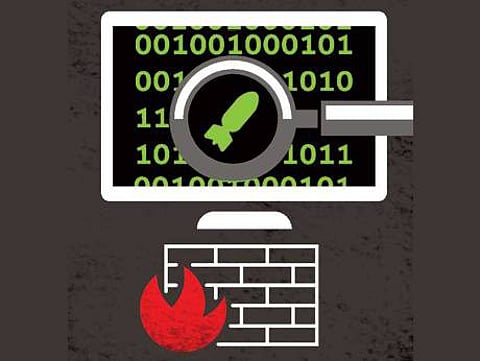Why I’m more worried about cyber-warfare
The idea that a tyrant needs something as sophisticated as a ballistic missile to inflict serious harm on a distant enemy is hopelessly outdated

One success; two failures. When North Korea claimed to have fired a missile from a submarine last weekend, Kim Jong-un was so thrilled by the spectacle of this weapon bursting from the sea that the portly “Supreme Leader” was photographed beaming with delight.
Five days later, Kim’s generals tried the simpler task of launching two missiles from dry land, only for both to fizzle out and plummet back to earth. Oddly enough, there were no pictures of this occasion. Month after month, North Korea tests a fearsome weapon — and occasionally explodes a nuclear bomb — in a way that is calculated to send a chill down our spine. But resist the temptation to shiver.
In truth, the old ritual of the North Korean missile launch does not matter very much. This is not because Kim is a harmless sort of dictator: the reality is actually even more worrying than it might seem.
The idea that a tyrant needs something as sophisticated as a ballistic missile to inflict serious harm on a distant enemy is hopelessly outdated. There was an era when any dictator who wanted the ability to cause havoc needed to surmount some formidable barriers to entry. They had to assemble huge missile programmes that took years and were always detected in the end, leading to punishing sanctions. Even when the ambitious dictator managed to build his arsenal, he would find himself up against western powers with far more capable missiles.
Having spent a fortune, he would be unable to use his weapons for fear of massive retaliation. Put simply, the tyrant would be successfully deterred. He would incur the costs and risks of creating a chilling armoury, only to be trapped in eternal stalemate.
But today, everything is easier. The advent of cyber-warfare means that you do not need to construct the vast infrastructure of a missile programme to cause mayhem; the only requirement is a team of able people with laptops and internet connections. If they are clever enough, this hit squad of nerds can knock out power grids, disable banking systems and paralyse normal life in a target country. And they can do all this from the safety of their office thousands of miles away.
Better still, if they are really clever, they can inflict their chosen variety of mayhem anonymously, without anyone being able to pin the crime on them. Deterrence presupposes retaliation, but how do you retaliate if you have no idea who attacked you? And all this — it bears repeating — can be achieved by a handful of nerds with laptops. The barriers to entry when it comes to possessing the means to wreak havoc are so low that just about every country could, in principle, surmount them.
So cyber-warfare evens the scales between minnows and great powers. North Korea and Iran will only ever possess a fraction of the military firepower of America; when it comes to cyber-attacks, by contrast, the balance is far more equal. Both Iran and North Korea have spotted this. They still go through the ritual of missile tests, yet both now regard cyber-warfare as being at least as important.
Iran, in particular, is bidding to join the premier league of cyber military powers. Back in 2012, Ayatollah Ali Khamenei, the Iranian Supreme Leader, approved the creation of a military “cyber-council” controlled by the Revolutionary Guard Corps. In the same year, Saudi Arabia’s national oil company, Saudi Aramco, came under furious cyber-attack. This incident turns out to have been far more damaging than was revealed at the time: the company’s payments and trading system was briefly paralysed. The team behind this onslaught called themselves the “cutting sword of justice” — a label previously adopted by Iranian hackers — and the finger of suspicion pointed towards Saudi Arabia’s old enemy on the far side of the Gulf.
This attack was relatively unsophisticated. The hackers seem to have found a Word document carelessly filled with administrator passwords for Saudi Aramco’s networks. What would have happened in the event of a full-blown assault is impossible to forecast. So do not try to frighten me with missiles flying out of the sea: that threat can be mastered and deterred. Frighten me, if you must, with the vision of faceless nerds hunched over their laptops.
— The Telegraph Group Limited, London 2016
David Blair is the chief foreign correspondent for the Telegraph.



